Jaguars were famous, once, for their silky in-line sixes and V12s – as well as their uniquely elegant English styling. Nothing else looks like Westminster Abbey.
And nothing else looked like an E-Type or XJS, either.
Jaguar lost that aspect when it decided to be more like BMW, Mercedes and Lexus in the looks department – and more like everyone else, when it decided to shy away from elegant saloons and sexy coupes in favor of the crossover SUVs everyone else is making.
So how to retain the Jaguarness without the looks?
Well, the in-line six is back. . .
What It Is
The F-Pace is a compact-sized, five-passenger crossover SUV that competes with other small – and sporty – prestige-brand crossover SUVs like the BMW X3, Mercedes-Benz GLC, Infiniti QX50 and Audi Q3.
It comes standard with all-wheel-drive, regardless of engine – and it offers a uniquely electrically supercharged in-line six cylinder engine, paired with a 48 volt mild hybrid system. 
You can also get it with a V8 engine – something almost none of its rivals – except the Benz GLC – offer. However, the cost of that engine is roughly twice the cost of the as-it-comes F-Pace, with a turbocharged four cylinder engine.
That one stickers for $49,995 to start.
With the new electrically-compressed six, the price rises to $59,395.
With the available 5.0 liter V8 (and 550 horsepower) an F-Pace SVR stickers for $84,600 – which is substantially more than the $73,900 Benz GLC 63 AMG, but it’s also packing substantially more horsepower than the V8 Benz, which tees up with a comparatively puny 469 hp.
The previously optional mechanically supercharged V6 has been replaced by a turbo-electrically compressed in-line six, paired with a 48 volt mild hybrid system designed to cycle the gas engine off and on – not so much to increase gas mileage but to decrease the amount of C02 gas emitted, which has become as much an issue for car companies to deal with as complying with gas mileage mandates.
The price of the updated F-Pace also goes up. A lot.
Last year’s base trim 25t – essentially the same as this year’s P250 trim – stickered for $45,200. The new version of essentially the same thing, $49,995.
That’s an uptick of $4,795.
The new turbo-electric-hybrid equipped version is also more expensive than last year’s mechanically supercharged V6, without the electric-assist.
It’s down on power, too.
The good news is there’s a new – larger – 11.4 inch curved LCD touchscreen display.
What’s Good
Better in the snow than a classic E-Type or XJ.
Available V8.
Leaper on the horn button still has Jaguarness.
What’s Not So Good
A Jaguar crossover is a weird animal.
V8 is only available if you can afford it.
Others in the class like the BMW X3 and Benz GLC cost thousands less.
The F-Pace one ups most of the others – except the Benz GLC – by offering three engine options rathe than the usual two.
The standard engine is a 2.0 liter turbocharged four that makes 246 horsepower; it is paired with an eight speed automatic and standard all-wheel-drive – which makes up some for the Jag’s higher-to-start MSRP vs. rivals like the X3 and GLC that offer AWD as an extra-cost option.
Unless, of course, you don’t want AWD and would rather not pay for it.
Equipped with its standard engine, the F-Pace takes 6.9 seconds to get to 60 – a couple of ticks behind the pace set by rivals like the BMW X3, which can make the sprint in 6.2 seconds.
Gas mileage with the four is 22 city, 27 highway
Another standard is 8.4 inches of clearance – about twice that of an old E-Type or XJ.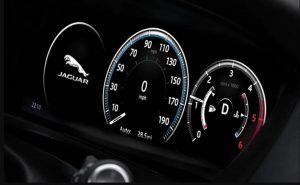
The second available engine is a new combination 3.0 liter turbocharged/electrically compressed straight six, paired with a 48 volt mild-hybrid setup that allows the gas engine to be regularly cycled off and back on without noticeable transitions.
There are also two versions of this combination.
One makes 335 horsepower; the other bumps that up to 395 horsepower. The first will get an F-Pace to 60 in 5.8 seconds; the higher-output version reduces that to 5.1 seconds.
As with the four, an eight speed automatic and AWD are paired with this engine as well.
MPG info wasn’t available when this review was written but is expected to uptick by about 3 MPG overall vs. the previous V6’s 18 city, 23 highway.
The third engine is a 5 liter V8, with a mechanical supercharger. It makes 550 horsepower – enough to get this Jaguar to 60 in 4 seconds or less.
It rates 16 city, 21 highway – slightly better on the highway than the old V6.
Jaguar has tried to infuse some Jaguarness into the F-Pace by resurrecting the in-line six, which once defined the brand – along with the V12s that won’t be coming back – and by making it quiet, via the electrically-assisted mild-hybrid system that’s bolted to it.
This system has the great virtue of eliminating the obnoxiously noticeable stop-start cycling that is common in cars that have stop-start systems, which is practically all of them of now. Which they do as a way to increase (slightly) gas mileage and decrease (also slightly) the “emissions” – as they are now styled – of carbon dioxide, the non-reactive gas that doesn’t cause smog or breathing problems but which some believe “change” the “climate.”
But people who pay Jaguar money aren’t enthused about the paint-shaker effect of stop-start “technology” – as it’s advertised. The best solution would be to nix the system altogether, especially since the gas saved by all that stopping and starting is less than 1 MPG overall, on average – and these “savings” are likely washed away by more often replacement of the over-taxed starter battery (and possibly the starter motor as well).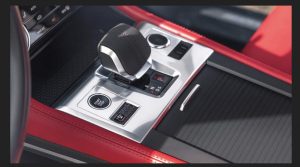
Not to mention the obnoxiousness of the engine noticeably shutting down at every light and pause in traffic – and then noticeably restarting again.
Over and over and over again.
The news system makes these transitions seamless. Unless you are focused on it – and really looking for it – as by looking at the tachometer – you will probably not be conscious of the engine going to sleep and then waking up. The 48 volt electrical system is four times as powerful as the usual 12 volt system and it directly spins the engine’s flywheel for almost-immediate as well as very quiet restarts.
The big downside, of course, is the cost of the system – reflected in the uptick in the F-Pace’s MSRP, including the MSRP of the standard engine-equipped F-Pace, which doesn’t have the 48 volt/mild hybrid system.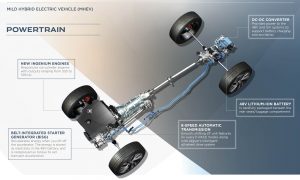
The cost of all of this – the cost of the government regulations behind all of this – is being spread out across the board.
And not just in terms of what it costs.
There is also what has been lost.
The new 3.0 liter turbo-electric drivetrain makes less power than the previous 3.0 liter supercharged engine (380 vs. 335). Even the stronger variant of the new 3.0 liter turbo-electric engine only makes 15 more horsepower while costing more than the old 3.0 liter supercharged engine).
There may be some gas savings – but given the type of vehicle we’re talking about, does it matter, unless spectacular? Official numbers for the ’21 F-Pace with the new straight six/mild-hybrid setup weren’t available when this review was written in early April but are not likely to be be much different from the 18 city, 23 highway posted by the ’20 F-Pace with the supercharged-only V6.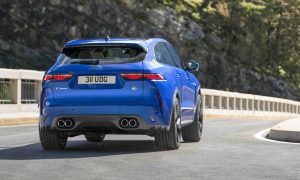
It might be a 3-ish or so MPG difference. Which is not much of a meaningful difference when the power is down – and the price is up, by several thousand dollars.
But then, it “changes” the “climate” less – if you buy that. And if you do, perhaps the cost is worth the expense.
The most Jaguar-ish version of the F-Pace is the V8-powered SVR – which I was able to savor last year. It may be jacked-up off the ground by twice as much as an old E-Type or XJR, but it is absolutely worthy of the leaper on the steering wheel horn button – which is one of the few relics of Jaguarness still remaining in new Jaguars. Almost none of which are saloons or coupes anymore.
Of course, there are other extremely quick super-crossovers available, including the AMG (and V8) version of the Benz GLC. The Porsche Macan, too.
But while quickness isn’t a problem, distinctiveness is.
Once upon a time, nothing else looked like a Jag.
It was among the main reasons for buying a Jag. It wasn’t like a Mercedes or a BMW. It was an alternative to them. As or even more luxurious, of course – but with a Savile Row style all it own.
Jaguars have less of that now – in part because it is difficult to make a crossover that doesn’t look pretty much like every other crossover. How do you make a circle look like a square?
The layout defines the look.
And so the F-Pace, while not stylistically objectionable in any way – isn’t stylistically exceptional. As the Jaguars of the past – like the E-Type and XJs of the classic era were. Those cars were the stuff of wall (and garage) art; sculpture you could drive.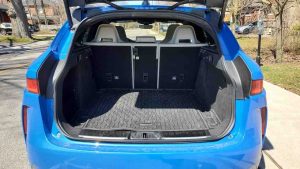
But the F-Pace is a great deal more practical, because of the layout. A mid-’90s Jaguar XJ sedan had a 12 cubic foot trunk, which is tiny relative to the size of an XJ – which was a full-size sedan, comparable to a Mercedes S-Class or BMW 7 of the same era.
The smaller-overall F-Pace (which was about the same footprint a current-year compact sedan) has 31.5 cubic feet of storage space behind its second row and with them folded, the load capacity increases to 69.1 cubic feet, almost six times the available space in the classic XJ sedan’s trunk.
It makes the F-Pace far more viable for carrying a bunch of kids and their stuff – especially in the era of child saaaaaaaaaaaaafety seats and all that cal. In the Olden Days – before the ’90s – you could pile in as many kids as would fit inside an XJ sedan and not have to sweat a Hut! Hut! Hut! Today, only two kids can ride in the backseat, strapped into their seats.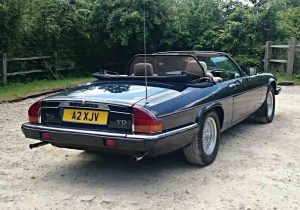
That plus the old Jag saloons – as the Brits style sedans – and coupes like the XJ-S were terrible in the snow, being rear-drive and low to the ground – making them beautiful, impractical things.
The F-Pace is very practical; just not beautiful in the way Jaguars once were.
The Rest
The F-Pace’s new 11.4 inch touchscreen isn’t flat, which adds a touch of uniqueness to this Jaguar – though it is a truism that technology is fleeting and what is (and looks) “high tech” today may look cheesy or at least, dated, by ten years from now.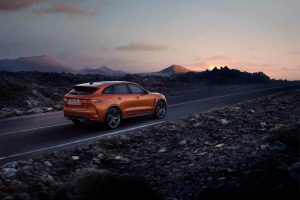
By which time, incidentally, Jaguar and Land Rover (the same company) have stated they will no longer be making anything other than entirely electric vehicles.
This means that models like the current F-Pace are the last of their type and – absent the inline six engines – it is even harder to see how Jaguar maintains its uniqueness.
On electrified crossover being very much like all the other electrified crossovers. Same basic shape – same basic motive source. Same sound, same feel.
Why bother?
The Bottom Line
Is it a Jaguar? Or just another crossover . . . with some lingering Jaguarness?
. . .
Got a question about cars, Libertarian politics – or anything else? Click on the “ask Eric” link and send ’em in!
If you like what you’ve found here please consider supporting EPautos.
We depend on you to keep the wheels turning!
Our donate button is here.
If you prefer not to use PayPal, our mailing address is:
EPautos
721 Hummingbird Lane SE
Copper Hill, VA 24079
PS: Get an EPautos magnet or sticker or coaster in return for a $20 or more one-time donation or a $10 or more monthly recurring donation. (Please be sure to tell us you want a magnet or sticker or coaster – and also, provide an address, so we know where to mail the thing!)
My eBook about car buying (new and used) is also available for your favorite price – free! Click here. If that fails, email me at [email protected] and I will send you a copy directly!


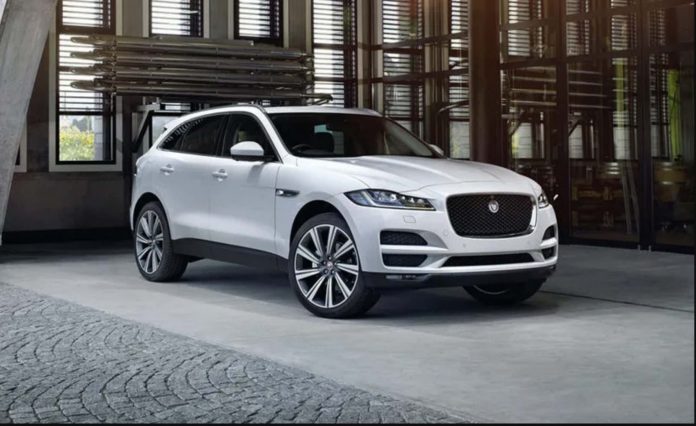

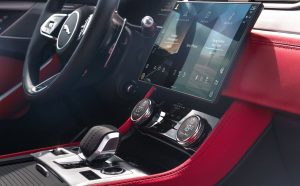

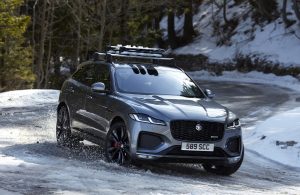
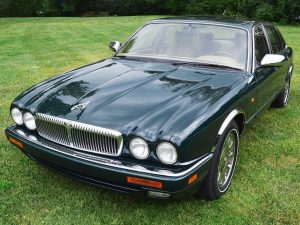







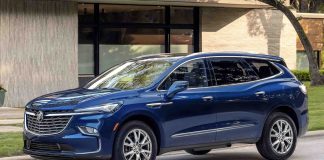
These new Jaguars are so horrible that I can barely look at them. What sort of men would take Jaguar’s beautiful design history, and stomp on it with both feet? This “thing” called a Jaguar F-Pace isn’t even a Jaguar. It’s a plastic children’s toy. But I guess if you want to destroy several hundred years of British culture and heritage, then you have to make a clean break with the past. This vehicle is an anti-Jaguar. When young people forget how Jaguars used to look, they’ll also forget all of the associations. Gentlemanly conduct, a love of art, the thrill of a fine car, and the special feeling of British culture as a blend of the old world, and the new. After the revolution, British culture, with all of it’s Victorian ideals about goodness, and refinement will be replaced with a giant Spice Girl Sex Party! Nobody will need refinement, or character. Religion and Philosophy will go into the dust bin, where they belong.
I came to Eric’s website because I realized that there might be a flaw in Jaguar’s fuel delivery system. There was a problem that used to occur quite frequently with petrol; it was called “vapor lock”. On a hot day, the gasoline would actually boil in the car’s fuel line before it got to the engine. This vaporized gasoline would stop the engine from running. So then you’d have to wait half an hour for the car to cool down. It was a hassle. But they solved that problem by cooling the gasoline on the way to the engine. But that created yet another problem, which they don’t seem willing to discuss. Hot gasoline is no good because it boils. But cold gasoline is also no good, because it’s too far from the boiling point to burn efficiently when it gets sprayed into the combustion chamber. Every modern car should be equipped with a device that heats the fuel line to about twenty degrees below the boiling point of the gasoline. That way, the petrol will ignite much faster when the spark plug fires. A fuel-line heater would cost around a hundred dollars, but it might improve fuel economy by twenty percent.
I doubt however, that the revolutionaries at Jaguar are concerned with the actual performance of their cars. After all, the intent of Jaguar management is to insult and mock the Jaguar tradition, so that young people will take no further interest in art or beauty, or their own heritage which is the true source of their identity. The Communists at Jaguar would make Jaguars even worse if they could. For them, a vehicle is not supposed to be an expression of social class, because as Marx said, social classes must be destroyed so that capitalists may no longer exploit the working class. From now on, the government will exploit them. And taxes are not exploitation, because government employees are good people; they deserve fifty percent of GNP. And that’s why nobody can buy a copy of “I Amness: The Discovery of the Self Beyond the Ego” by Ian Kent. It’s an instruction manual on how to destroy England. I pity poor Ian, he’s been sent down the memory hole. So I guess he won’t even get the credit.
https://www.amazon.com/Amness-Discovery-Self-Beyond-Ego/dp/0672515342
Hood morning, Ron –
I also weep for Jaguar, whose cars awakened me at a young age to the magnificence of industrial design. I had a friend growing whose father kept a V12 XJ. We used to raise the hood and admire that engine; then the rest of the car. Such cars are now a part of history and it is – as you say – an incredibly tragic loss.
I’ll go against the grain on this one, compared to most commenters below. If I were interested in an mid sized SUV, it would be this with the big engine or a GC SRT. My older mom wanted a mid to small SUV recently and of course, she asks her two car guy sons. We both told her this Jag with the big engine. She likes power (had the coolest RX7 ever ’96). She ended up not listening to her sons and got a Q3. “how do ya like it mom?”
‘It’s ok, but it has no power’.
Jag could stand out in the market with a wagon or minivan. These SUV’s all look alike. I couldn’t see laying down that kind of cash for something so boring to the eye. Obviously the market says otherwise though. I’m sure they’ll sell a bunch of these.
I remember how infuriated I was when they revealed the current XJ in name only.
Ian Callum truly did a number on Jag with his modernist design philosophy.
I agree, Handler –
Jaguars were once such beautiful cars – so much so that their various flaws were not only forgivable but endearing. Back in high school, a friend’s dad had an XJ-S with the V12. We’d pop the hood and just look at it in awe…
I sort-of already know the answer, but I’ll ask anyway: Why don’t the European automakers build a 2.4L V8 engine? They’re pretty common in F1 racing, and I think Lamborghini had one in production (such as it was) the 1970s. The EU says displacement is limited, not how you get to that volume. Most of these vehicles will already be subject to gas guzzler taxes anyway, so why not stick to the letter of the law and give buyers what they want?
Will anyone actually buy a 4 cylinder Jag?
Hi RK,
Yeah, but those Indy engines are pretty peaky little things, eh? I think it’d be better if someone – anyone – at a major car company, in a position of authority, openly told the government GFY and made its case to the public. It might be as pointless as the Savage and Bernard Marx in Brave New World attempting to explain to the Epsilon Semi Morons why Soma was bad for them… but a noble effort, regardless.
Yea, but imagine the sound of a 2.4L V8 revving up to 10,000 RPM out of a hairpin turn on a mountain highway…
True!
Aber, I bet those little screamers make very little torque; recall the S2000 VTEC four….
Yes, my first thought, probably like everyone else, was “It looks like everything else”.
That said, an electric supercharger is an interesting idea. Perhaps something that could be bolted to nearly anything, along with a better alternator? Or, maybe that wouldn’t save as much work as I’m thinking.
Anything like that out there?
Costs you $35 to find out if they work.
https://www.ebay.com/itm/BLACK-3-Electric-Turbocharger-Supercharger-Cold-Air-Intake-Generator/163544127104?hash=item2613fd5680:g:O-cAAOSwNSxVLYp0
Well, I’ll bet a bathroom fan would be quite the peach if bolted onto the intake!
Perhaps a low cost model would be a friend in the passenger seat with a bicycle pump.
I think this car shows whats happening in most cars today – smaller, less powerful engines, replaced by bigger screens in the middle ! as if mankind doesnt spend enough time staring at screens !! To be fair I dont even like the digital gauges most new cars get – and really enjoy the manual ones – just look a lot more genuine for some reason.
Ive driven the older version of this car – I did find it one of the more fun SUVs to drive out there, though dont quite know if its just the Jag driving position. I really want the SVR version of this – though the thing doesn’t depreciate (infact ive noticed that the more high performance versions of most cars just dont depreciate anymore – I suspect as many have realised these are the last good years for performance cars).
Thing is however the family car (the X3) is starting to get the electrical bugs, which from what I read are the main reasons BMWs from the 2000s are retired – so think I need to start thinking of a replacement for that….. what fun to drive medium / small SUVs do you recommend?
subaru crosstrek. its a blast. mine has a five speed manual.
Hi Mark,
I will second the Crosstrek; it is a Subaru like they used to make ’em. Space efficient, relatively simple and available with a manual. Most of all, inexpensive!
Hi Mark and Eric – Subarus aren’t that common in the UK, and very much enthusiast cars, so a bit concerned about getting it on the second hand market, and maintaining it as the main family car. A cousin had one of those high performance ones from the early 2000s, but had to give it up after he got into career and family as it was too expensive to maintain and took too much time as not everyone would service. But yeh a manual transmission is something id want (though not so much the mrs- who wants an auto).
Hi Nasir!
I’d avoid any luxury/prestige brand – unless you intend to replace it/re-lease after say 3-5 years. The long-term prospects for any of these over-teched things are not good. Also: Do you want an SUV -or a crossover? SUV-wise, the Toyota 4-Runner would be an excellent choice; for a crossover-something-similar, the Honda Passport is another. For something smaller – in a crossover – the Subaru Crosstrek is outstanding and the Honda CR-V/Toyota RAV4 hard to go wrong with.
I guess my ownership horizon is around 5 years (the current X3 has lasted 7 years, was already 7 years old when I got it). Though I guess I was lucky that it is from the second generation X3, which is essentially the first generation with some body panels – which is probably just a raised 3 series, with a manual gearbox making it quite fun to drive for what it is. Also given its a base spec none of the electronic crap that nags or annoys – which makes it so hard to give up for a more modern car !! But the 2000s were probably the best years for BMW.
Interestingly – in the UK we get very base spec german cars, like the Q3, Q5, or even VWs. The other advantage of the European brands is you can still get diesel – most of the Japanese have gone mostly Hybrid which is probably fine but diesel seems to be much cheaper on the second hand market here (as its now disgraced by the media) -making it very good value. Also some of the Audis can be had with a Manual gearbox (though not sure the wife is keen on manual anymore !)
I was going to look at the Toyota RAV 4 because the neighbours have the lexus version of that and quite like it (though as we are in lockdown all dealers are closed!) Will also check out the CRV when dealers open.
My ownership age is about 25-30 years. Sure it would be worn out but you can replace the drivetrain for cheap and door gaskets and the like aren’t crazy expensive. I put new pin bushings in the doors and replaced the gaskets on my 93 K3500 and you had to nearly slam the doors to get them closed it was so tight and quiet.
And having a non-computer controlled diesel is right up my alley.
I don’t get everything having so much power. Are we all racing. People certainly don’t drive like their cars have any power at all. When it comes to mileage, nearly every car GM made in the 90’s got 30-32 mpg at 70mph. No doubt they wouldn’t have outrun the new cars but in Texas we have so many DPS there’s not anyplace I’d want to do more than 80. I generally have a cold one in the console so setting it on 75 and making sure all my lights are functioning properly keeps me pretty invisible. They don’t even notice an old man. They’re looking for someone they can stop for speeding who aren’t really speeding and search them and get some street cred from “their” crowd.
I can tell you I don’t want to drive in Texas with plates from another state….nor vice versa. Back about 5 years ago, Dodge made pickups that were just quitting going down the road. They were replete on the shoulders, sometimes with the sticker still on the window. Often the hood was up and I knew of at least two people that had it happen and there was nothing they could see that was wrong except it wouldn’t run. I saw a new Dodge Ext Cab upside down on I 20 one day and it looked like it was a bad wreck. I later saw it at the impound lot and the owner was there. He said he’d been on the other side of the interstate when the right rear wheel exploded causing it to jump and spin and land in the far barditch on the side he hadn’t been on. He and his girlfriend were beat up but didn’t have any bad injuries. He walked me over and showed me the wheel. It was a fancy one Dodge put on the higher end pickups but it was no longer there except for part of the hub and lug nuts. I asked if he’d been hauling big loads or pulling heavy trailers. He laughed and said he’d never had anything in the bed and pointed to the bumper that had no ball and had never had one. He said he thought he’d change brands when the insurance company paid it off. I can’t help but think Dodge knew those wheels weren’t good but they’d last longer than being a few weeks old.
I don’t want a vehicle I can’t even tell what is wrong when it has problems. I need to replace my valve cover gaskets and it lets me know now every time I get out and smell burning oil. But Amsoil has cleaned whee out of that engine. When I bought it the lifters rattled like crazy but I gave little for it and thought I’d just change lifters and go on my merry way. I had no idea you had to remove the heads on LS engines to get to the lifters. Knock on wood, it rattles a bit on startup but smooths out and runs fine……so far. It went from using a quart of oil every 3500 miles when I bought it to not using oil at all after a few changes of Amsoil. Now when you pull the stick the oil looks good even with several thousand miles.
Eric,
This is really a jag?
Looks like an over inflated Gremlin.
Remember the days when you could toss the temperamental 12 and replace it with a 350?
Is the picture of the cat a sticker or is it at least molded into the grill?
You’ve mentioned templates before. What other vehicles use this particular template?
Hi T,
It’s a molded/pressed-in badge, I think. Embedded with the steering wheel button. I wasn’t going to try to peel it off!
I was asking about the one outside the driving/restraint area.
What is the reason to buy one car-suv-hybrid thingy over another these days?
They all look the same & performance/mileage is close enough for most of them.
The jag is faster than most of the others, but not sure it’s $20,000 faster
Price & badging I guess.
Autos are just so blah right now.
Hi Dan,
Yup… excepting last week’s TRX!
But of course. That thing is bad ass – the way vehicles should be if we want them that way.
‘The second available engine is a new combination 3.0 liter turbocharged/electrically compressed straight six, paired with a 48 volt mild-hybrid setup that allows the gas engine to be regularly cycled off and back on without noticeable transitions.’ — EP
Electrical compression offers fine-tuned control over boost that isn’t possible with mechanical supercharger drive. And a mild-hybrid setup can supply a bit of extra oomph when needed.
But then they go and sh*t the bed with the absurd objective of ‘allowing the gas engine to be regularly cycled off and back on’ — BLEGHHH! *vomits in disgust* I do not FREAKING WANT an engine that cycles on and off outside MY control. I will not buy a vehicle that exhibits such unacceptable, dysfunctional, patently objectionable behavior.
Proprietary, highly integrated computer control seems to have killed off the old hot rod mainstay of transplanting engines. Too bad. Installed in an attractive vintage vehicle, rather than an anonymous jelly-bean body with comically hypertrophied wheels, Jaguar’s 3-liter supercharged straight six might actually be a rather exciting powerplant.
Certainly my first ride in an E-type was an eye-opener. Its bad-ass rumble was the first notion I’d ever had that a straight six could give the big, lazy muscle-car V8s of the day a run for the money.